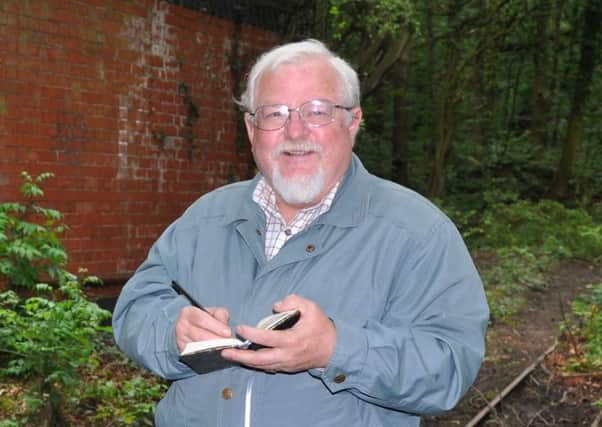Geoffrey Shryhane's My World


Of course, the picture that immediately jumps into the mind is of a child sitting on the loo and pieces of the puzzle dropping in every direction. What fun!
Lovers of Lancashire will find much to entertain them in “Growin’ up in Lancashire” in which Brian Carline recalls memories of his northern childhood.
Advertisement
Hide AdAdvertisement
Hide AdI turned the pages and became lost in a world of nostalgia when lads were often described as “gormless” and kids risked life and limb retrieving pieces of coal from the railway line.
Early on in his book, Brian gets right down to some serious business by scribbling about the toilet arrangements in terraced houses. As yes, I remember it all very well indeed.
Oh how posh those who had an inside lavatory
He says they called those who didn’t have such a facility as the “bucket and chuck it” brigade.
Izal loo paper was a little bit of one-up-man-ship from newspaper. And the author tells how some family friends purloined some from Salford Dole Office. Problem was every sheet was stamped “Government Property”.
Advertisement
Hide AdAdvertisement
Hide AdBrian, a former teacher, recalled how one parent sent in a sick note for their son. It said: “My son Gary was not at school yesterday cos he was suffering from dyor (crossed out), dyeeeyer (crossed out)….the trots.” The note was written on a sheet of, yes, you’ve guessed it, Izal-loo paper.
Computers were yet to be invented. So it was a world of games after school and as the first fingers of darkness came, mothers would bawl and shout for their kids to “get in before you get your death of cold”.
Brian’s is a totally enthralling book – if you were born after the 50s, then it allows you to peer through the keyhole and catch a glimpse of a bygone era.
It was a time when everyone stood up for the national anthem at the end of the film at the pictures. A time when the wireless was the chief source of entertainment and the streets emptied daily at 6.15 so people could tune in to listen to Dick Barton Special Agent.
Advertisement
Hide AdAdvertisement
Hide AdGastronomically, everything was fried in beef lard, the washing was whitened with Dolly Blue and most kids were forced to take foul-tasting cod liver oil neat from the spoon. Uck!
Growin’ up in Lancashire. Palatine books. £7.99
It’s a wonderfully descriptive word – distressed.
I remember how distressed my uncle was when, cycling home drunk, he toppled into a ditch. Similarly distressed, an old reporter friend who, travelling to a Latics away match, lost his week’s wage playing cards. And I well remember a young lady who was more than distressed when someone asked her when the baby was due. Truth was she’d piled on weight.
But in recent times, “distressed” has been used to describe items of furniture which have been deliberately knocked about a bit, scratched and perhaps even given a good kicking. All in the name of furniture fashion.
I reflected that the wonky and falling-to-bits kitchen cabinet we had back in the 60s might now have been worth a fortune had we not put it on the bonfire. Damn.
Advertisement
Hide AdAdvertisement
Hide AdA friend of mine (yes I do have three) said: “You must come and see our daughter’s new house. Honest, it’s the last word.”
“Well,” I mused. “Something to look forward to.”
So go I did and after a tour of the new home, I have to admit to a mixture of amusement and confusion. Naturally I said how fantastic and original everything was. When in truth, a lot of the stuff looked like it had come off the local tip.
“It’s distressed” said the new bride. “It’s all the rage today. Some of its new, we distressed some things ourselves.”
Vandalism was the word that sprung to mind.
It’s true, the cupboard doors weren’t hanging off but to me the stuff looked and was a world away from the traditional old stuff at Shryhane towers.
Advertisement
Hide AdAdvertisement
Hide AdStill, as they say, it takes all styles of furniture to make a home.
I suppose if you stretched a point, you could decide that Wigan “in’t th’owd days” was part of Lowry land. All those smoking chimneys. The blast furnaces at Wigan Coal and Iron Works. The sound of mill hooters and killer atmospheres.
Day by day, month by month, year by year, heavy industry was ripping the guts out of our town. One writer in the 1920s described Wigan as “a town without hope”.
No-one can deny that Wigan gained a country-wide reputation as a dirty old town. People who have never been here whispered: “Sounds like an awful place.”
Advertisement
Hide AdAdvertisement
Hide AdIn fact there were many grimy towns just like Wigan in the north. Hundreds of them. But it was Wigan that seemed to bear the brunt of the downmarket comments.
Somewhere in the archive is a photo purporting to show a photo of Wigan – the skyline dominated by dozens of belching chimneys. The shocking image is teamed up with an image of beautiful Mesnes park.
In fact in my long lifetime in Wigan, I have seen this town pull itself up by its bootstraps. Many acres of slums have been demolished, the mill chimneys belch no more, and the mines have vanished. It’s true, with them went vast numbers of jobs. That was the price that had to be paid.
Even today, our town is undergoing changes for the better and people who visit are pleasantly surprised. One even commented: “It’s amazing…not one mill chimney left.”
The dirty old town has gone forever.
More My World musings in the Wigan and Leigh Observer out every Tuesday.